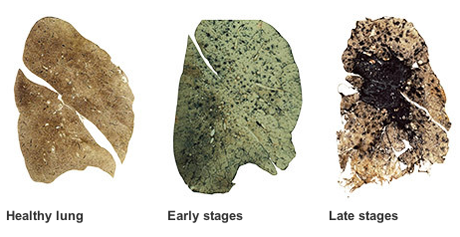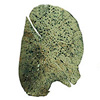House Republicans are trying to block efforts to protect coal miners from black lung disease. This comes just days after the Center for Public Integrity released a big report showing that black lung is making a comeback:
From 1968 through 2007, black lung caused or contributed to roughly 75,000 deaths in the United States, according to government data. In the decades following passage of the 1969 law [that first addressed black lung], rates of the disease dropped significantly. Then, in the late 1990s, this trend reversed.
The Charleston Gazette explains how efforts to halt this trend are being stymied:
House Republicans are seeking to extend their measure that blocks the Obama administration from moving forward with a new rule aimed at combating the resurgence of deadly black lung disease, which experts say has reached epidemic proportions in the Appalachian coalfields. …
If approved, the language would forbid [the Mine Safety and Health Administration] from using any funds from its budget to finalize its October 2010 proposal to tighten legal coal-dust limits and improve other protections for miners.
“House Republicans’ proposal to stop modern protections against black lung disease for our nation’s miners is outrageous and should be defeated,” said Rep. George Miller, D-Calif., and ranking minority member of the House Committee on Education and the Workforce.
United Mine Workers President Cecil Roberts said the budget measure “amounts to nothing more than a potential death sentence for thousands of American miners.”
“Preventing black lung isn’t a matter of overregulation,” Roberts said. “It’s a matter of life and death.”
Emphasis added. The industry response?
Industry officials argue that recent increases in black lung rates are a regional problem and don’t require a new nationwide rule. Industry supporters in Congress have claimed that black lung rates have not increased and have blamed miners for not protecting themselves from excess dust.
That’s three arguments:
- The increase is regional.
- Cases haven’t increased.
- It’s the miners’ fault.
Responses:
- No, it isn’t.
- Yes, they have, as reported above.
- Of course it isn’t. From the CPI report:
Donald Marcum knew he was at least a passive participant in something that was against the rules, maybe even criminal. Every couple of months, his bosses had to send MSHA five samples showing they were keeping dust levels under control. The man with the greatest potential exposure — often Donald because he was running a continuous mining machine, which chews through coal and rock and generates clouds of dust — was supposed to wear a pump to collect dust for eight hours.
That almost never happened. Most of the time, he said, the mine foreman or someone else would take the pump and hang it in the cleaner air near the mine’s entrance.
When MSHA inspectors showed up to take their own samples, it wasn’t so easy to cheat. Donald would actually wear the pump, but he and his co-workers would mine only about half as much coal as they normally did, generating far less dust.
If it’s the miners’ fault, it’s only because they understand the games they need to play to keep their jobs.
If opponents of better regulation were smart, they’d take a page out of the playbook of Big Tobacco, back when it, too, was trying to argue that it shouldn’t be regulated. Here’s an opinion piece that ran in the Chicago Tribune in 1998. Its author was an employee of the libertarian Cato Institute.
Prof. W. Kip Viscusi of Harvard Law School calculates that the extra health-care costs of smokers are about 50 cents per pack of cigarettes. But smokers do not live as long as non-smokers and, thus, smokers create savings for taxpayers that usually aren’t considered. Because smokers die earlier than non-smokers, taxpayers save expenditures that otherwise would be made for pensions as well as nursing home care and other costs related to conditions associated with old age.
When those savings are computed (at a 3 percent discount rate), they more than offset the costs that smokers create. Smokers actually save society about 32 cents per pack smoked.
That’s the argument that the mining companies and their friends on Capitol Hill should make. Take the head of the mining union’s concerns and run with them. Embrace that death sentence. Own it. Remove all the regulations in their entirety. The miners will die much faster and not be a drain on the government as their lungs atrophy and they slowly, eventually stop being able to breathe. Saves tax dollars. Plus, it’s a job creator: you don’t have much choice but to replace the dead guy.
Politics really isn’t that hard once you stop caring about the people you’re supposed to represent.

Image courtesy of NIOSH.






